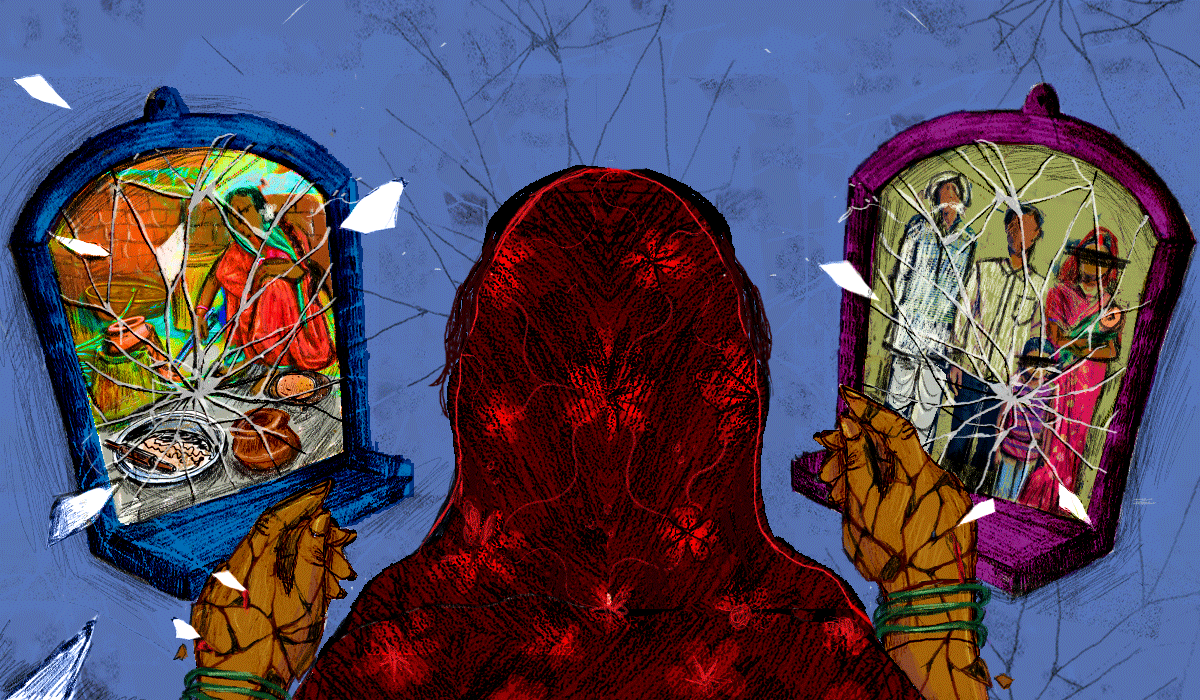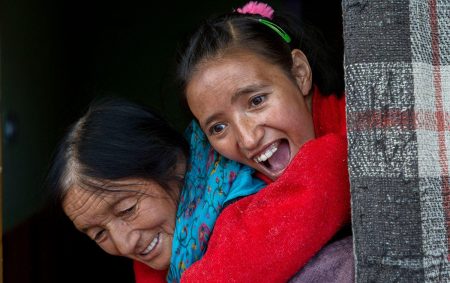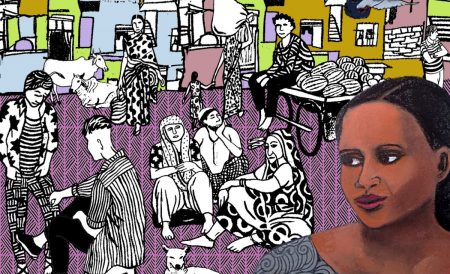The Third Eye worked with 12 caseworkers in rural and small town Uttar Pradesh, and through a process that included immersive writing, theatre-based pedagogies and year long workshops, the caseworkers became the lexicographers of The Caseworkers’ Dictionary of Violence.
What is a samjhauta? It is a decision made to wrap up disputes, in a way that ensures everything goes smoothly in the future. In my opinion, a samjhauta could turn out to be either successful, or utterly unsuccessful. When women enter a samjhauta in a state of intense emotion, they are unable to negotiate smoothly. But those who approach it with mind, heart and reason are able to get a samjhauta that is successful to a large extent. If nothing else, at least they do not regret their decision.
Our organisation follows certain principles: we do not arrange for a samjhauta in case of serious offenses like rape, dowry deaths or murders. However, in case of beatings, arguments and fights; or situations where a woman is evicted from the home along with her children or harassed for dowry, we draw up an iqraarnama according to the decision made by the woman.
In my experience, it is the woman who always initiates a samjhauta whether she is at fault, or not. The reason is that she bears the burden of upholding the reputation of both --- her father at her maternal home and her husband at her in-laws’ home.
When a woman or her children are harassed, the first compromise she makes is with herself. She tries to convince herself that the husband will mend his ways, if not today, then tomorrow. If he does not change despite this, she is overcome by emotion and takes a decision. This is enough. I cannot live with my in-laws anymore. I will go back to my parents’ home; I will work, and bring up my kids somehow by doing manual labour. She calls up her parents. The parents in turn come to us and narrate the problems their daughter is facing. They tell us, she will either get killed by her in-laws, or she will take her own life. In this situation, we can only advise them to take their daughter away with them. If they seek our support, we accompany them to the in-laws’ house along with the police. Once the daughter is returned to the parents’ house, we counsel them.
For some days, the woman stays with her parents and bears the taunts of her family, her relatives, and society at large. She works harder than she would at her in-laws’ place. What is a woman subjected to at her own natal home? Many times, she has to bear the same burdens that had forced her to escape her in-laws’ home. And then, she is compelled to settle for a samjhauta, even if she does not want to.
There is a case about Rukmini, a girl who was married in Harpalpur. She has three sons. When she was seven months pregnant, she was beaten up badly by her husband and mother-in-law. They did not give her food for two days. A fellow villager called up her father and informed him. When the father went to pick her up from the in-laws’ place, he was verbally abused and beaten up. He went to the police station, weeping, where no one heard him out. Dejected, he returned to his village. One day, he was sitting under a tree and thinking about what to do about his daughter, how to get her out of her in-laws’ home. An anganwadi worker and an ASHA bahu from Rukmini’s in-laws’ village were passing through and happened to meet the father. The father told them about his daughter’s situation. The women gave him my phone number. They asked him to talk to me, assured him that his problem would be solved very soon, and that we would be able to get his daughter out of her in-laws’ place.
Shortly afterwards, the father called us up. We reached Harpalpur police station, and directed him to do the same. We spoke to the superintendent, who said, “Madam, you have a seat. We will bring the girl here.” The police superintendent and a policewoman accompanied the father to Rukmini’s in-laws’ home, and brought her back with them. She was in a terrible condition. Her body was bruised. She was unable to talk due to hunger and starvation. Despite her suffering, she refused to file a report. I dropped her off at her parents’ home. What was she to do with her three kids? What did she have to endure?
Rukmini was fine at her parents’ home for a few days. She didn’t have a mother; only her father lived with her. Her brother worked somewhere outside the village. During this time, Rukmini would also work as a wage labourer and take care of her children. In the middle of this, her father took advantage of her and began sexually abusing her. What must she have been going through? What could she have done in this situation? She was unable to confide in anyone for the sake of her family’s reputation; this really stifled her. She wanted to live alone with her kids, but her father would not allow her. Whenever I spoke to her, she talked fearfully. I could sense that she was troubled, but I did not know why. I felt that I should visit her at home. When I did, she told me “Didi, please get a samjhauta done for me. I want to go back to my in-laws.” When I asked her for the reason behind her request, she and her 10-year-old son confided in me. I was shaken.
I counselled Rukmini and offered her two to three propositions. She was ready to leave her father’s home in order to live alone. It was decided that she would rent a room in Karvi and support herself through wage labour, with some help from the organisation. After straightening out these details, I was heading back when her husband called me and said, “Didi, I made a mistake. I will not beat her up anymore. Please help me work out a samjhauta. I am ready to accept all of my wife’s demands.” He talked to his wife, asked for forgiveness and convinced her to come back with him. Rukmini ended up agreeing with this arrangement and told me that I should help her draw up a compromise, and that she wants to go back to her in-laws.
I was unsure of how to proceed in such a situation. I was afraid Rukmini might find herself in the same condition even after the samjhauta. The organisation deliberated and talked to Rukmini. As per the decision, we set up a date for the samjhauta when both the parties would have to come to the office. When we phoned Rukmini on that day, we got to know that the husband had already taken Rukmini and the kids with him. Over the phone, she explained, “My husband touched my feet and asked for forgiveness. He accepted his mistake, so I went along with him. When I told him that both of us are expected at the office, he said, “We will go to didi’s office once we have properly settled down.’”
A week later, both husband and wife came to the office along with the kids. When I saw them, in that moment it did not seem like there ever had been a problem.
Rukmini had not told her husband about how her father had abused her. Whenever her father would visit to take her home for festivals, she would always refuse. Her husband wondered why. One day, the younger son told his father about the reason. Once the husband knew, it was only a matter of time before he threw his wife out of the house along with the kids, declaring that she was not worthy of him anymore.
Rukmini now lives alone with her kids. She does wage labour to support herself and her kids, and is happy to build a life for herself.
Where do women go in such situations? They are caught between giving up on life, or continuing to suffer sexual and mental harassment.
Translated from the Hindi by Pakhi Pande





